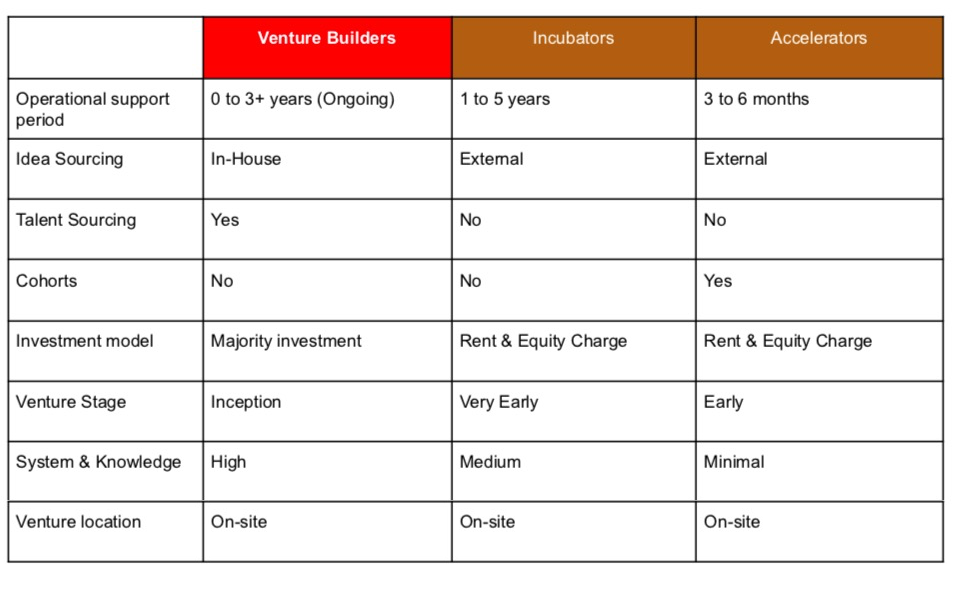Startups are easy to start, difficult to maintain, and extremely hard to grow because of competition. You will need a lot of capital investment to fuel your startup engine. This sparks the question of the relevance of these options based on the entrepreneur(s) and startup(s) involved. Is it Venture Builder? Should we jump for Startup Accelerator Or should we go for Startup Incubator?
Comparing definitions and value provided
Venture builder
Simply put, a start-up studio that builds, develops, launches, and scales startups. Their process flow can be summarized as follows:
- Generate ideas, explore prototype concepts, and work on “in-house” projects to identify
new business opportunities - Build/recruit founding teams for the startups they develop
- Facilitate access to seed/early-stage capital
- Provides shared services for key resources required for operations
The trade-off for the support provided and a monthly salary is a much smaller amount of equity allocated to the hired founders/CEO. Thus, this model is wonderful for a fresh CEO/founder that wants to run a startup.
Startup accelerator
The model is all about growth-driven ventures in their infancy to achieve product-market fit and secure their first users/customers within a relatively short period. It is worth noting that startup accelerator programs often combine financial support with training, mentorship and business networking.
Startup incubator
While Accelerators aim to ‘speed up’ the growth of new businesses, Incubators encourage “innovation” and disruptive technologies. Thus, they are much more focussed on bringing the idea from paper to product with the usual support period of at least one year or more.

The right model for your startup CEO career
Choose incubators if you align with this scope
Incubators lay their eyes on promising founders that are entering the beginning stages of building their businesses. The startup often only possesses an idea to a market and wants to develop them into a working prototype, or a minimum viable product (MVP).
A Startup Incubator is your best option when you are searching for:
- MVP development: Your service/product still needs to be improved before it can be delivered into the market and accessed by all customers.
- Co-founder(s) or founding team members: Your startup is struggling due to the lack of core members.
- Taking root instead of scaling up: You are seeking guidance to focus on establishing the business model, plan and goal. In other words, your business is not ready to scale up quickly.
Choose accelerators if you align with this scope
The goal of the accelerator is primarily to help startups grow fast and strong, within a short span of time. Thus, they only accept startups that have a strong foundation and are looking for (pre-)seed investment.
A Startup Accelerator is relevant for you, if:
- Your idea has reached the Minimum Viable Product stage: You already have a proof of concept, developed a working prototype, and done enough customer development to fill-up your business model canvas. All that is left is trying to launch successfully.
- It is time to scale up: You need a high amount of capital to fuel your growth and gain greater business traction.
Choose venture builder if you align with this scope
Those two models mentioned above all focus on helping founders/CEOs to run their own startups more efficiently. However, their involvement in the startup’s day-to-day operations is limited and passive when compared to that of Venture Builders.
So for entrepreneurs that do not have any experience with startups before or looking for an opportunity to advance their career through running one, the Venture Builder operation model is a great choice as:
- You can learn how to run a startup from the ground up: Instead of spending years of trial and error to figure things out and conquer the steep learning curve, you are able to jump right into the thick of the action and with the initial resources and operational capabilities available.
- You are paid in salary while running a startup: Whilst a monthly salary lowers your opportunity cost for entrepreneurship, the tradeoff is a lower shareholding and upside, as most of the startup’s equity would be owned by the Venture Builder itself.
- You do not have to deal with every problem at once: There should already be a playbook and structure in place for business operations. What this means is that you shouldn’t be tied down with the administrative grind, and you can focus on moving fast and breaking things.
Conclusion
It is no news that there are many pathways to build and grow a startup but some will be much harder while others are much easier. In the case of Venture builders, entrepreneurs are empowered to kickstart their startup career with the initial ingredients and recipe that’s ripe for success.
Trung Ho is a digital marketing lead at Tech JDI, a venture support service provider that helps tech companies expand their businesses and tech teams into Vietnam.
TechNode Global accepts contributions relevant to entrepreneurship and innovation. You may submit your own original or published contributions subject to editorial discretion.

